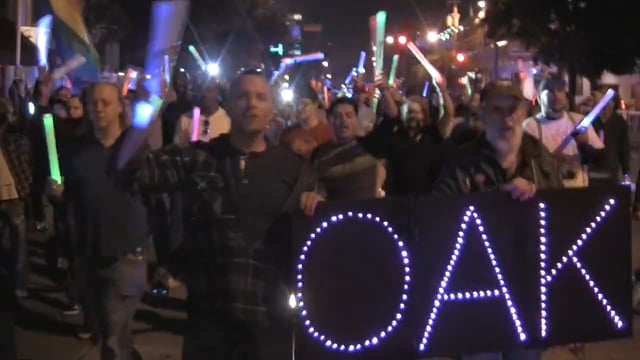Last September, Blake Rasnake was walking in Oak Lawn when he was struck with a bat on the left side of his head. He was pulled into a van, pinned down with a pair of knees on his shoulders, and punched in the face repeatedly. As he was thrown to the sidewalk, Rasnake was bombarded with derogatory comments, called a “stupid fag.” He survived, but it was only the first of 18 reported attacks against gay men in Oak Lawn in about nine months.
As the number of attacks increased, community members began to hold rallies throughout the neighborhood. It was at one of the rallies in October that Steven Pomerantz decided to film the movement and turn it into a documentary, Taking Back Oak Lawn. The film, which premiered in April at the USA Film Festival, originally started out as a platform to address the attacks, but ended up snowballing into a story about a bigger movement within the city’s LGBTQ community, to stand together and restore a sense of safety to the neighborhood.
Michael Dominguez and Burke Burnett, both survivors of attacks, played a key part in the movement, and because of them, Pomerantz was able to film every interview, committee meeting, and town hall meeting about the issue. Pomerantz says he was out filming three to four nights a week. In Oak Lawn, police patrols were increased, lighting added, and cameras installed, but attacks have continued ever after the release of the film. Of the 18 attacks, not one had a witness, none were caught on surveillance cameras, and only one was officially classified as a hate crime by Dallas police, Pomerantz says.
“Everybody who was attacked was a gay man in the Oak Lawn area,” he says. “In my mind, it doesn’t get ‘defined’ as a hate crime. To me, they’re all hate crimes. They’re targeting a specific area and a specific type of person.”
There’s a lot of frustration packed into the film, but it’s a topic we’re all too familiar with today. And after 49 people were massacred at a gay nightclub in Orlando two weeks ago, Taking Back Oak Lawn took on a different meaning.
“[The attacks in Dallas are] a different type of tragedy, because no one has been killed here yet,” Pomerantz says. “I’ll say ‘yet’ because eventually, I feel that if these attacks keep happening, someone’s going to end up getting killed at some point.”
It’s a reality that we have to face and come to terms with. Pomerantz says more than 1,000 people were in attendance at the Resource Center for a June 13 vigil for the victims of the Orlando tragedy, one of the largest crowds he has seen gather in Dallas.
[d-embed][/d-embed]
As the number of attacks increased, community members began to hold rallies throughout the neighborhood. It was at one of the rallies in October that Steven Pomerantz decided to film the movement and turn it into a documentary, Taking Back Oak Lawn. The film, which premiered in April at the USA Film Festival, originally started out as a platform to address the attacks, but ended up snowballing into a story about a bigger movement within the city’s LGBTQ community, to stand together and restore a sense of safety to the neighborhood.
Michael Dominguez and Burke Burnett, both survivors of attacks, played a key part in the movement, and because of them, Pomerantz was able to film every interview, committee meeting, and town hall meeting about the issue. Pomerantz says he was out filming three to four nights a week. In Oak Lawn, police patrols were increased, lighting added, and cameras installed, but attacks have continued ever after the release of the film. Of the 18 attacks, not one had a witness, none were caught on surveillance cameras, and only one was officially classified as a hate crime by Dallas police, Pomerantz says.
“…if these attacks keep happening, someone’s going to end up getting killed at some point.”
“Everybody who was attacked was a gay man in the Oak Lawn area,” he says. “In my mind, it doesn’t get ‘defined’ as a hate crime. To me, they’re all hate crimes. They’re targeting a specific area and a specific type of person.”
There’s a lot of frustration packed into the film, but it’s a topic we’re all too familiar with today. And after 49 people were massacred at a gay nightclub in Orlando two weeks ago, Taking Back Oak Lawn took on a different meaning.
“[The attacks in Dallas are] a different type of tragedy, because no one has been killed here yet,” Pomerantz says. “I’ll say ‘yet’ because eventually, I feel that if these attacks keep happening, someone’s going to end up getting killed at some point.”
It’s a reality that we have to face and come to terms with. Pomerantz says more than 1,000 people were in attendance at the Resource Center for a June 13 vigil for the victims of the Orlando tragedy, one of the largest crowds he has seen gather in Dallas.
Watch Taking Back Oak Lawn on Vimeo.
[d-embed][/d-embed]






